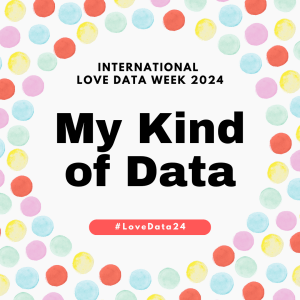Getting a Handle on Third-Party Datasets: Researcher Needs and Challenges
By Rafael, on 16 February 2024
Guest post by Michelle Harricharan, Senior Research Data Steward, in celebration of International Love Data Week 2024.
ARC Data Stewards have completed the first phase of work on the third-party datasets project, aiming to help researchers better access and manage data provided to UCL by external organisations.
The problem:
Modern research often requires access to large volumes of data generated outside of universities. These datasets, provided to UCL by third parties, are typically generated during routine service delivery or other activities and are used in research to identify patterns and make predictions. UCL research and teaching increasingly rely on access to these datasets to achieve their objectives, ranging from NHS data to large-scale commercial datasets such as those provided by ‘X’ (formerly known as Twitter).
Currently, there is no centrally supported process for research groups seeking to access third-party datasets. Researchers sometimes use departmental procedures to acquire personal or university-wide licenses for third-party datasets. They then transfer, store, document, extract, and undertake actions to minimize information risk before using the data for various analyses. The process to obtain third-party data involves significant overhead, including contracts, compliance (IG), and finance. Delays in acquiring access to data can be a significant barrier to research. Some UCL research teams also provide additional support services such as sharing, managing access to, licensing, and redistributing specialist third-party datasets for other research teams. These teams increasingly take on governance and training responsibilities for these specialist datasets. Concurrently, the e-resources team in the library negotiates access to third-party datasets for UCL staff and students following established library procedures.
It has long been recognized that UCL’s processes for acquiring and managing third-party data are uncoordinated and inefficient, leading to inadvertent duplication, unnecessary expense, and underutilisation of datasets that could support transformative research across multiple projects or research groups. This was recognised in the “Data First, 2019 UCL Research Data Strategy”.
What we did:
Last year, the ARC Data Stewards team reached out to UCL professional services staff and researchers to understand the processes and challenges they faced regarding accessing and using third-party research datasets. We hoped that insights from these conversations could be used to develop more streamlined support and services for researchers and make it easier for them to find and use data already provided to UCL by third parties (where this is within licensing conditions).
During this phase of work, we spoke with 14 members of staff:
- 7 research teams that manage third-party datasets
- 7 members of professional services that support or may support the process, including contracts, data protection, legal, Information Services Division (databases), information security, research ethics and integrity, and the library.
What we’ve learned:
An important aspect of this work involved capturing the existing processes researchers use when accessing, managing, storing, sharing, and deleting third-party research data at UCL. This enabled us to understand the range of processes involved in handling this type of data and identify the various stakeholders involved—or who potentially need to be involved. In practice, we found that researchers follow similar processes to access and manage third-party research data, depending on the security of the dataset. However, as there is no central, agreed procedure to support the management of third-party datasets in the organization, different parts of the process may be implemented differently by different teams using the methods and resources available to them. We turned the challenges researchers identified in accessing and managing this type of data into requirements for a suite of services to support the delivery and management of third-party datasets at UCL.
Next steps:
We have been working on addressing some of the common challenges researchers identified. Researchers noted that getting contracts agreed and signed off takes too long, so we reached out to the RIS Contract Services Team, who are actively working to build additional capacity into the service as part of a wider transformation programme.
Also, information about accessing and managing third-party datasets is fragmented, and researchers often don’t know where to go for help, particularly for governance and technical advice. To counter this, we are bringing relevant professional services together to agree on a process for supporting access to third-party datasets.
Finally, respondents noted that there is too much duplication of data. The costs for data are high, and it’s not easy to know what’s already available internally to reuse. In response, we are building a searchable catalogue of third-party datasets already licensed to UCL researchers and available for others to request access to reuse.
Our progress will be reported to the Research Data Working Group, which acts as a central point of contact and a forum for discussion on aspects of research data support at UCL. The group advocates for continual improvement of research data governance.
If you would like to know more about any of these strands of work, please do not hesitate to reach out (email: researchdata-support@ucl.ac.uk). We are keen to work with researchers and other professional services to solve these shared challenges and accelerate research and collaboration using third-party datasets.
Get involved!
 The UCL Office for Open Science and Scholarship invites you to contribute to the open science and scholarship movement. Stay connected for updates, events, and opportunities. Follow us on X, formerly Twitter, and join our mailing list to be part of the conversation!
The UCL Office for Open Science and Scholarship invites you to contribute to the open science and scholarship movement. Stay connected for updates, events, and opportunities. Follow us on X, formerly Twitter, and join our mailing list to be part of the conversation!
 Close
Close




